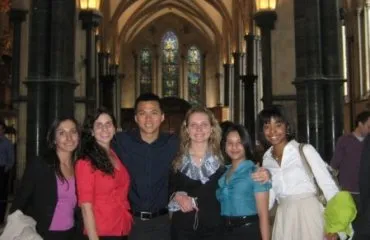Information for First Year Students

The world of Fellowships and Prizes is highly competitive. There are some things you can do now, as a first-year student, that will help you prepare for grant applications in your sophomore, junior and senior years. It's never too early to start planning!
Be informed.
- Read the newspaper daily and one or two news weeklies (such as Time, Newsweek, The Economist, etc.).
- Listen to NPR, BBC News, etc.
- Watch the Sunday political roundtables (Meet the Press, etc.).
Be involved.
- Join groups (on and off campus) that represent issues you care about.
- Find your niche within these groups - ways that you can make a unique contribution and help lead their efforts.
Be well-rounded.
- Stretch yourself and explore diverse subjects and interests.
- Pay attention to trends in popular culture.
Be a speaker / discussion leader.
- Take all the opportunities you can to speak publicly. Public speaking is excellent preparation for scholarship interviews which often take place in front of large selection committees. Volunteer to lead class discussions; make public presentations on behalf of a campus organization; and seek out other chances to get in front of a group.
- Participate in theatrical productions or musical and dance performances.
Be forward-thinking.
- It's hard to know now what you will be doing with the rest of your life, but start thinking about it! Where do you see yourself five years after college? Ten years after college? Imagine that someone is introducing you at an alumni event in the year 2022 - what are they saying about you?
- Start developing goals for yourself based on what your potential future career might be.
Be an autobiographer.
- The personal statement is one of the most important components of a grant application in which you talk about your background; life experience; personal, academic, and professional interests; and aspirations. It's an opportunity to give the reader insight into who you really are.
- Practice writing about the aforementioned topics: Write a brief (one page) bio about yourself that could be read and understood by someone who doesn't know you well. Make it engaging by using anecdotes and examples to illustrate your points.
- Keep a journal to help you remember highlights from your life experiences, and to strengthen your writing skills.
Be a strong student.
- It's important to be involved in extracurricular activities, but don't lose focus on your course work. The most competitive grants require GPAs of 3.7 or higher (Rhodes, Marshall, Mitchell).
- Others fall in the 3.0 to 3.5 range. Always look to see if there are GPA requirements before applying for a grant.
Be a planner.
- Make an appointment with Fellowships and Prizes to talk about travel grants, internships, and scholarships that might interest you later in your college career. It's never too early to plan!



